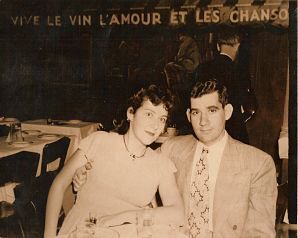National Work and Family Month (October) was launched just twelve years ago, and lots of people are still just learning about it. In fact, the whole concept of "work-family balance" -- or however you choose to phrase it -- often feels like a peculiarly modern concern, born of feminism, economic changes and other factors that led to the predominance of two-earner households and/or single parent homes. But of course, this is a strictly middle class view; many families have had to struggle along without a stay-at-home parent for generations. As it happens, though I was raised in a middle class family in the era of "Mad Men," both my parents worked throughout most of my childhood.
My mother got interested in early child development while in college. She started a nursery school for the children of veterans returning from World War II, and continued teaching preschool for years. I am the youngest of three -- my brother and sister are six and eight years older than I, respectively. When each of us was born, my mother would briefly stay home, then return to teaching, at least part-time. None of us can remember how this worked exactly, but I believe she relied on a series of part-time babysitters. Then, as soon as we were old enough, she'd enroll us in whatever "nursery school" she was teaching in.
My sister vaguely remembers my mother, her nursery school teacher at the time, bringing my brother -- then an infant -- along with her to school. (Whether that was on one occasion or the norm we don't know.) Another story goes that at age 5, my brother was a latchkey kid, letting himself into an empty house after school and waiting by the window -- coat and cap still on -- until my mother came home a short while later. Personally, I was told that at age 3 I called my mother "Mrs. Hardman" right along with the other kids at school.
By the time I was eight, a brand new experiment called "Head Start" had been launched, and my mother got a job teaching there. Some years later, "nursery school" began to get a whole new branding with the rapidly-spreading phenomenon of child care centers. (The concept was looked upon with suspicion at first, at least in my house. I believe my mother thought -- not without justification in some cases -- that any place focused on meeting the needs of the parents could not also be fully focused on meeting the needs of the child.) In any case, by the time I was in what was then known as junior high, my mother was co-administering a very small chain of day care centers.
Meanwhile, throughout this entire time, my father worked a series of traditional, full-time jobs. He was a chemical engineer, doing research for large companies, like Westinghouse.
All of this (except for my father's job) was pretty unusual in the middle-class Pittsburgh neighborhood where I was raised. Most of my friends' mothers stayed home, at least through elementary school. This was such an accepted fact of life in those ancient days that my own elementary school had no cafeteria -- it closed for an hour at lunchtime and we were all expected to walk home, where it was assumed a mother would be waiting to feed us. Of course, as is still the case with most schools today, it closed again at 3-ish in the afternoon, but the concept of after-school care was literally unheard of -- home we all went once more. Needless to say, PTA meetings, school plays and other such events all took place during the day. (Surprisingly, I think parent-teacher conferences -- what we called "Open House" -- were scheduled for the evenings.)
Somehow, despite this indifferent, if not downright hostile, environment, my parents managed to make it all work. Looking back, I'm amazed at how they seem to have worked it all out with so little fuss, in part by completely ignoring the era's assumptions about gender roles. Here's what I remember:
- Elementary school lunch-time coverage for me was cobbled together in one of three ways -- at least once a week, a cleaning woman came, whose job apparently included a certain amount of child care. I don't remember much about her, I'm afraid, except that she introduced me to the concept of the cheese sandwich. One or two other days a week, I was a latch-key luncher. (To be honest, these were my favorite days, when I could eat my sandwich in front of The Match Game or wile away the time improvising my own make-believe TV commercials, featuring my smiling face and the peanut butter jar.) And then, at least a couple days a week, my father actually left his job and drove home to make me lunch.
When it comes to figuring out how to meet the needs of both their jobs and their families, women and men in the U.S. today are on their own to an unconscionable degree. But it's nothing compared to what my parents must have dealt with, facing a world in which their reality was not even a blip on the collective radar.
Robin Hardman is a writer and work-life expert who works with companies to put together the best possible "great place to work" competition entries and creates compelling, easy-to-read benefits, HR, diversity and general-topic employee communications. Find her at www.robinhardman.com.

